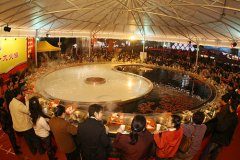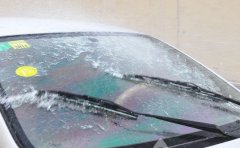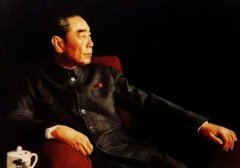词语趣谈5(2)
Valuable, Precious
Valuable(adj.)---“值钱的”,“有价值的”。指价值巨大, 出售就可得高价;
也可表示意义或作用的重大。
Precious(adj.)---“贵重的”,“宝贵的”。指因稀罕或来之不易,
或具有极大价值而非常值钱,
有时也指一个人对某件物品特别喜爱。
例:Mrs Forester has a valuable diamond.
弗雷斯蒂夫人有一颗贵重钻石。
It is a valuable discovery.
这是一个有价值的发现。
That old toy bear is precious to John.
那只旧的玩具熊对约翰来说特别珍贵。
She owned many precious jewels.
她拥有许多贵重珠宝。
--------------------------------------------------------------------------------
Kindle, Fire, Ignite, Light
Kindle(v.)---“点燃”。强调着火的迟缓和困难。
Fire(v.)---“点燃”。通常指火的突然爆发。
Ignite(v.)---“点燃”。限于用在指通过某种方法使物体升温而迅速或猛烈燃烧。
Light(v.)---“点燃”。强调点燃后的结果,如光亮?热力或烟火等。
例:This wood is too wet to kindle.
这些柴太湿了, 很难点着。
The sparks kindled the dry wood.
星火燃着了干木。
It took several bundles of twigs to fire the logs.
点燃这些大块圆木需要好几捆枝材。
He fired a baystack.
他点燃了一个草堆。
An electric spark ignites the petrol in a car engine.
电火花点燃了汽车引擎。
Petrol ignites very easily.
汽油极易点燃。
She lighted the lamps.
她点着了那些灯。
It's time to light up.
该开灯了。
--------------------------------------------------------------------------------
Kind, Sort, Species, Type, Category
Kind(n.)---“种类”。指同种类的东西。
Sort(n.)---“种类”。指大体相似的东西, 有时用于贬义判断。
Species(n.)---“种类”。指相同种类的生物。
Type(n.)---“种类”。指不太明确类别的划分,有主观判断之意。
Category(n.)---“种类”。正式用语。指对材料?或图书等进行分析而划分的种类。
例:This is the best kind of pen.
这是最好的一种钢笔。
I can feel at home in this kind of room.
在这样的房间里我感到象在家里一样。
What sort of food do you like best?
你最喜欢吃什么食物?
I will make no attempt of the sort.
我不愿做这种事。
This is an extinct species of fish.
这是一种已经灭绝的鱼。
Blackmail is a species of crime which we all hate.
恫吓勒索是我们大家憎恨的一种罪行。
The horticulturist developed a new type of rose.
园艺师培育了玫瑰的一个新品种。
Her beauty is of the Italian type.
她的美是意大利型的。
Put it there, it belongs to that category.
把它放在那儿,它属于那一类。
Place these books in categories, please.
请把这些书分门别类地进行整理。
--------------------------------------------------------------------------------
Kill, Assassinate, Execute, Dispatch, Murder, Slay, Slaughter
Kill(v.)---“杀”,“杀死”。普通用语。指任何一种致死行为。
Assassinate(v.)---“暗杀”。指出于政治目的进行的暗杀行为。
Execute(v.)---“处决”。指依据法律,判处死刑。
Dispatch(v.)---“杀死”。指采用直接方法,如刺,射击等手段杀死,强调迅速。
Murder(v.)---“谋杀”,“凶杀”。指非法地?有目的的杀害他人。
Slay(v.)---“杀死”,“杀害”。指残酷地打死或用武器杀死。现多用过去分词slain。
Slaughter(v.)---“屠杀”。尤指为肉食而屠杀;还指错杀或残酷地杀死很多人。
例:Two people were killed in a car accident.
在一次车祸中有两人丧生。
The frost killed the flowers.
霜把花冻死了。
President Kennedy was assassinated in Dallas in 1963.
肯尼迪总统于1963年在达拉斯被暗杀。
Martin Luther King was assassinated by a white people.
马丁路德金是被一个白人暗杀的。
Nathan Hale was executed as a spy by the British in 1776.
1776年,内森黑尔被英国人当作间谍处决了。
Mussolini was caught by Italian guerrillas on April 27, 1945,
while trying to escape to Switzerland and executed after a brief
trial.
1945年4月27日,墨索里尼试图逃往瑞士时,被意大利游击队抓获,经简短审讯之后,即被处决。
The injured horse was dispatched by its owner.
受伤的马被他的主人杀死了。
The executioner quickly dispatched the condemned man.
行刑者迅速将该犯处决了。
According to the historians he murdered his rival in cold blood.
根据历史学家考证,他蓄意杀死了他的竞争对手。
It is said that one person was murdered on the beach.
据说一个人在海滩上被谋杀了。
The slain man has not yet been identified.
被杀的人至今还未被查出身份。
He was slain in battle.
他战死在沙场。
Many cattle and sheep are slaughtered here.
这儿屠宰了许多牛羊。
Tens of thousands were slaughtered on the battlefields of
Macedonia.
成千上万的人在马其顿战场上被杀死了。
--------------------------------------------------------------------------------
Keen, Acute, Penetrating, Sharp, Shrewd
Keen(adj.)---“锐利的”。普通用语。一般指刀或尖的锋利。
用于比喻时,指看穿一切事物,含有慧眼?耳聪和机敏之意。
Acute(adj.)---“尖锐的”。一般指角的形状。用于比喻时,指思维敏捷。
Penetrating(adj.)---“锐利的”。强调透过细节调查事物根源的能力。
Sharp(adj.)---“锐利的”。普通用语。一般指刀的锋利。用于比喻时,强调有洞察力,有时含不诚实的意味。
Shrewd(adj.)---“锐利的”。表示谙于世故,遇事老谋深算,有看穿一切事物内情的能力。
例:He is a keen politician.
他是个厉害的政治家。
Tom keeps a knife with a keen edge.
汤姆有一把锋利的小刀。
He is an acute observer.
他是一个敏锐的观察家。
This is not a right angle, but an acute one.
这不是直角,而是锐角。
The professor gave us a penetrating analysis of the play.
教授给我们作了一次深刻的剧本分析。
Premier Zhou has an extremely penetrating mind.
周总理头脑异常敏锐。
The knife is not sharp enough and need grinding.
这刀不快,需要磨了。
I have a sharp mind for figures.
我头脑聪明,善于计算。
He is too shrewd to trust in bussiness matters.
他在商业事务上太精明了,不能信赖。
He is a shrewd politician.
他是个精明的政客。
--------------------------------------------------------------------------------
Jump, Leap, Skip, Spring
Jump(v.)---“跳”,“跃”。普通用语。泛指从地面跳起,或从一平面跳下。
Leap(v.)---“跳起”,“跳跃”。指连跑带跳,有姿势轻快?活泼和优美之意。是书面语。
Skip(v.)---“跳”,“跃”。指轻快灵巧的跳跃,比如孩子们或小动物的欢蹦乱跳。
Spring(v.)---“跳”,“跃”。指有力和有弹性的突然跳跃。
例:They jumped for joy when they heard the news.
他们听到这消息,高兴得跳了起来。
It is dangerous to jump off a moving train.
火车在行驶时跳下来是很危险的。
They leaped lightly over the stream.
他们轻捷地跳过了小溪。
The young deer were leaping about in the meadow.
小鹿在草地上到处跳跃。
Girls like to skip rope.
女孩喜欢跳绳。
Lamps like to skip across the meadow.
小羊喜欢在草地上欢蹦乱跳。
A boy sprang from his seat.
一个男孩突然从座位上跳了起来。
He sprang out of bed when the alarm went off.
听到警铃响,他从床上跳下来。
--------------------------------------------------------------------------------
Journey, Excursion, Expedition, Tour, Trip, Travel, Voyage
Journey(n.)---“旅行”,“旅程”。普通用语,指陆地上的远程旅行。
Excursion(n.)---“旅行”。较正式,指海上或陆地上的短期外出。
Expedition(n.)---“旅行”。指为某一特定目的而组织的艰巨而危险的远征。
Tour(n.)---“周游”。指途中在许多地方作短暂停留的观光游览。
Trip(n.)---“旅行”。指来往有定的短距离旅行,
强调在路上所花的时间和所走的路程。
Travel(n.)---“旅行”。惯用复数形式。泛指旅行各地,
表示旅行的路途远,时间长。
Voyage(n.)---“旅行”。常指距离较长的海上旅行, 也可指太空旅行。
例:At first I was afraid the long journey would be too much for her.
起初我担心她不能行这样远的路。
I wish you a good journey.
(祝你)一路平安。
The family made a weekend excursion to a camp ground.
全家周末去宿营地旅行。
The whole excursion took ten hours.
整个短途旅游花了十个小时。
My brother was once a member of the mount Everest Expedition.
我弟弟曾是珠穆朗玛峰登山队的队员。
Our country has sent several parties of people on an expedition to
Antarctic.
我国已派了几队人到南极探险。
We went on a guided tour of Italy that included stops at
Milan,Venice,Florence and Rome.
我们在导游的带领下游览了意大利, 包括米兰,威尼斯,佛罗伦萨和罗马。
They are now making a bridal tour.
他们正在新婚旅行。
I go to work by train, and the trip takes 40 minutes.
我坐火车上班, 路上花40分钟。
I can't afford a trip to Europe.
我负担不起去欧洲旅游的费用。
This trip was cancelled because of the snowstorm.
因为暴风雪, 旅行取消了。
The travels of Marco Polo is one of the most interesting books that
I have ever read.
马可波罗的游记是我生平读过的最有意思的一本书。
Is he back from his travels yet?
他游历回来了吗?
He made a long ocean voyage to Africa.
他远航去了非洲。
We made a rough voyage from London to Australia.
我们作了一次从伦敦至澳大利亚的艰苦航行。
--------------------------------------------------------------------------------
Jail, Prison
Jail(n.)---“监狱”。英国的拼法为goal。在英国指民事监狱,
在美国指收容犯有轻罪的人或未经判决的人的收容所?看守所等;
现在也指监狱。
Prison(n.)---“监狱”。指大型的监狱。是指监禁判刑的罪犯?等待受审的嫌疑犯?俘虏等的地方。
例:They have Birdsong in jail.
他们把伯德押在牢里。
The court committed a prisoner to jail.
该法庭将罪犯投入监狱。
The thief was sent to prison for a year.
那个小偷被判处一年监禁。
He came out of prison.
他出狱了。
--------------------------------------------------------------------------------
Utter, Express, ronounce
Utter(v.)---“说出”。指发出任何听得见的声音。强调发出的声音具有突然性和爆发性。
Express(v.)---“说出”。指用语言表达自己的思想或感情。
Pronounce(v.)---“说出”,“发音”。可表示人的发音,或具有发音能力;在正式场合中,指宣读?宣判等。
例:She uttered a scream of terror when she saw a snake.
当她看见一条蛇时, 发出了一声害怕的尖叫。
The old man uttered a sigh in the dark room.
在漆黑的屋子里老人发出一声叹息。
It can not be expressed by words.
无法用语言来表达它(不可言传)。
Can you express yourself in English?
你能用英语表达你的意思吗?
My baby can pronounce this word without any difficulty.
我孩子读这个词没有任何困难。
I now pronounce judgement on the issue.
我现在宣布对这一问题的意见。
--------------------------------------------------------------------------------
Use, Consume, Expend, Employ, Utilize
Use(v.)---“用”,“使用”。普通用语。指事物时有消费的意义,指人时,对这个行动表示强烈的不赞成。
Consume(v.)---“用”。表示用尽,耗尽,指用在自己身上。
Expend(v.)---“用”。与consume同义,但多指付出的方向。
Employ(v.)---“使用”。较正式用语。指人时有“雇用”的意思;也可用于物,但无消费之意。
Utilize(v.)---“使用”。强调使用有益的方面。
例:The company now uses a computer to do all its accounts.
该公司现在使用一台电脑处理一切账目。
He uses every means to prevent it.
他用各种方法阻止它。
They asked how many bottles of wine he consumed in one year.
他们打听他一年里喝了多少啤酒。
We consumed much time and energy in writing this book.
我们写这本书消耗了很多时间和精力。
He lived high and expended largely.
他生活奢侈,花销很大。
She expended all her capital on equipment.
她将所有资本用于设备。
The mill employed a thousand workers.
这家工厂雇用了一千名工人。
You could employ your spare time better.
你可以把业余时间利用得更好些。
To avoid an oil shortage more machines must utilize solar energy.
为了避免石油短缺,更多的机器必须使用太阳能。
Can we utilize straw as fodder?
我们能利用稻草作为饲料吗?
--------------------------------------------------------------------------------
Yet, Already
Yet(adv.)---"已经".与Already一样均用于谈论某一特定时间之前可能完成的某项动作.
Yet只用于否定句和疑问句中.
Already(adv.)---"已经".常用于肯定的陈述句中,也可用于疑问句以表示惊奇.
例:Has the bell rung yet? --- It has not rung yet.
已经敲钟了吗? --- 还没有.
I've started learning Greek, but I haven't got very far yet.
我已经开始学习希腊语,但只是刚刚入门.
John hasn't done much work yet, but Anne has already finished.
约翰还没做多少工作,可是安妮已经做完了.
Have you finished lunch already? It's only 12 o'clock.
你已经吃过午饭了吗? 刚刚12点.
--------------------------------------------------------------------------------
Zero, Cipher, Nil, Nought
Zero(n.)---"零".普通用语.是指没有数量和大小等意义时人们喜欢用的词.
Cipher(n.)---"零".指0-9的任何一个阿拉伯数码,表示"无"时,具有象征意义.
Nil(n.)---"零".多用于体育或新闻领域.
Nought(n.)---"零".美语为naught,在字面意义上与cipher同义.
例:His chances of success sank to zero.
他成功的机会降到了最低点.
It was fifteen degrees below zero.
气温是零下十五度.
One followed by two ciphers is 100.
一的后面跟两个零是一百.
I can't bear such a cipher any longer.
我再也不能忍受这样一个无用的人了.
The result of the game was three-nil.
比赛结果是三比零.
The new machine reduced labor costs to almost nil.
新机器把劳动力的成本几乎降到零.
My effort came to naught.
我的努力终成泡影.
0.01 is usually read point nought one.
0.01通常被读作 point nought one.










